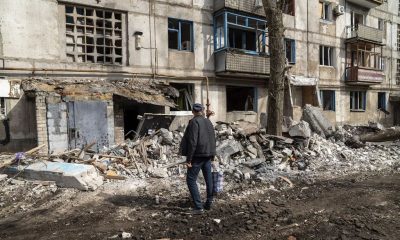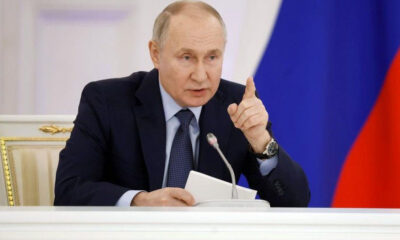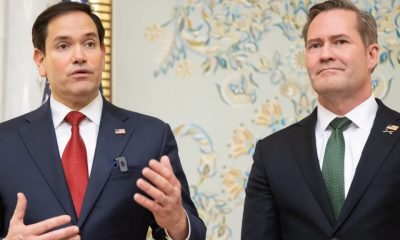International
Volodymyr Zelensky silences Irish parliament all the way from Ukraine

President Volodymyr Zelensky hushed the Irish parliament on Wednesday all the way from Ukraine, on a day when the languages of the two countries intermingled inside and outside the chamber.
The histories of the two countries are intertwined, the Dail heard, as Mr Zelensky spoke to a state marking 100 years since its foundation.
Those sentiments came not from Mr Zelensky himself, but from the politicians who pledged solidarity to the people of Kyiv, Mariupol, Bucha and a host of other war-torn towns.
The Ukrainian leader, when he spoke at 10am on Wednesday, had a different script to the leaders who have previously addressed a joint sitting of the Oireachtas.
He did not, like Tony Blair in 1998, regale politicians with memories of childhood holidays in Co Donegal.
Neither did he share snapshots from career-making moments in Dublin, as European Commission president Jean-Claude Juncker did in 2018.
The only Irish poetry referenced came from Ceann Comhairle Sean O Fearghail, who cited WB Yeats.
Instead, Mr Zelensky asked for help during the first virtual address in the history of the Oireachtas.
What Irish politicians heard was a demand for Irish and European support for the country in the face of Russian aggression.
Gratitude too, but calls to go further.
Mr Zelensky said Ireland has supported Ukraine from the start of the war.
READ ALSO:
- Putin adviser vows legal battles against attempts to seize Russian assets
- Man dies crashing car into Russian embassy in Romanian capital
- Ekiti 2022: Oni escapes assassination as thugs invade SDP secretariat
He said: “You did not doubt starting helping us, you began doing this right away and, although you are a neutral country, you have not remained neutral to the disaster and to the mishaps that Russia has brought to Ukraine.”
The voice of the Ukrainian leader, which has been heard in parliaments all the way from Brussels to Washington, was replaced by that of a translator.
But unmistakable was the impassive face of Mr Zelensky, which loomed above legislators from two screens behind Mr O Fearghail.
Dressed in military green, the Ukrainian president looked on as Irish politicians wore bright hues of blue and yellow.
Lapels, dresses and pocket-squares were all turned into expressions of silent support for Ukraine.
At the entrance to the Dail chamber, Oireachtas staff had also placed two small baskets of yellow and blue flowers.
Looking on too were around 50 ambassadors to Ireland from countries around the globe.
For them hunger is a weapon against us ordinary people as an instrument of domination
Mr Zelensky told those gathered that Russia is using hunger as a weapon in its war against his country.
“This night, our territory was again hit by Russian missiles,” he said.
“They are destroying things that are sustaining livelihoods to people.
“They also have blocked all of our sea ports, together with the vessels that had already agricultural cargos for exports.
“Why are they doing this? Because for them hunger is a weapon against us ordinary people as an instrument of domination.”
The Ukrainian leader stayed just long enough to hear a message of support from Irish premier Micheal Martin, who had sat upright, leaning forward, as he listened intently.
Mr Zelensky must have heard too, from thousands of miles away in Ukraine, the thunderous applause from senators and TDs inside the Dail chamber.
Not all members applauded – four People Before Profit TDs refused to clap, even as other politicians stood for a minute of applause.
The reason, a spokesperson said, was a disagreement with calls from Mr Zelensky for Nato involvement in the war, as well citing demands for more sanctions and a “decision to ban opposition parties” in Ukraine.
“Russia will have to live with the shame of what they have done in Ukraine for generations. Those responsible will be held to account,” Mr Martin told the Dail.
“We are with Ukraine and I am certain that, in the end, Ukraine will prevail.
“We are a militarily neutral country. However, we are not politically neutral in the face of war crimes. Quite the opposite.”
Outside the gates of Leinster House in the Irish capital, a small group of Ukrainian supporters gathered to listen to proceedings.
Irish and Ukrainian schoolchildren from St Joseph’s in the Dublin suburb of Fairview sang the national anthems of the two countries.
Nick Kozlov, from the Ukrainian Crisis Centre, led the crowd in chants.
“I believe, if we have young people like this, Ukraine will never be beaten,” he said.
As the two languages blended together outside, inside Leinster House the histories of the two countries were explicitly linked.
One hundred years after the creation of the Irish Free State, Ireland’s own struggle for independence was invoked, as was 19th century Irish political leader Daniel O’Connell and African-American abolitionist Frederick Douglass.
“In the long history of our own country, we have never invaded another but we do know what it’s like to have been invaded,” Tanaiste Leo Varadkar told the Dail.
“And to have the very existence of our national identity questioned too. For these reasons, we feel for the idealism of the Ukrainian people – their defiance and their determination to face down a new evil empire.”
Unity and silence reigned for most speeches, punctured only by renewed opposition calls for the expulsion of the Russian ambassador – a move resisted so far by the Irish Government.
Sinn Fein leader Mary Lou McDonald, dressed in white, said it is “long past time” to eject Yury Filatov.
That demand was conspicuously clapped by some TDs on the Government benches.
There was levity too.
Senator David Norris, partially kept from the corridors of the Seanad by ill health, made an appearance.
His particularly loud cheers at various stages in proceedings prompted applause and laughter, as well as compliments from Climate Minister Eamon Ryan.
But above all else, there was poignancy.
“Slava Ukraini,” Mr Martin told the embattled Ukrainian leader as he ended his speech.
Only a few metres above him, invisible to the Taoiseach, Ukrainian ambassador to Ireland Larysa Gerasko looked on.
Ms Gerasko, surrounded by colleagues, echoed quietly: “Slava Ukraini.”
INDEPENDENT
International
$100m coin collection buried for decades to be auctioned

$100m coin collection buried for decades to be auctioned
A coin collection, much of which remained buried underground for over 50 years, is expected to surpass $100 million at auction, according to experts.
Named the Traveller Collection, this extraordinary assemblage is believed to be the most valuable coin collection ever brought to auction.
The coins will be sold gradually over the next three years, with the first auction set for May 20.
Beyond its immense value, the collection’s origins make for a fascinating tale.
Spanning over 100 territories and encompassing coins from ancient times to the modern era, the collection is being auctioned by Numismatica Ars Classica.
What sets it apart is that most of the coins remained hidden underground for half a century before resurfacing.
According to a press release shared with CNN, the anonymous collector behind the collection began acquiring gold coins after the Wall Street Crash of 1929.
Over time, he developed “a taste for coins with great historical interest, beauty and rarity” and eventually amassed approximately 15,000 coins.
During the 1930s, he and his wife traveled extensively across the Americas and Europe, acquiring rare and historically significant coins while meticulously documenting their purchases.
READ ALSO:
- EFCC re-arraigns son of ex-PDP chairman for alleged N2.2bn oil subsidy fraud
- Group says Natasha’s recall will deepen democracy
- We welcome Gov Makinde’s U-turn on Shari’ah panel – MURIC
Despite settling in Europe at a time when Hitler’s Nazi party loomed over the continent, the collector sensed the impending danger. In response, he carefully packed the coins into cigar boxes, which were then placed inside aluminum containers and buried underground, where they remained undisturbed for five decades.
Among the collection is a 50 Toman coin, part of an “exceedingly rare” set minted in Tehran and Isfahan during the late 18th and early 19th centuries.
International
AI will replace doctors, teachers, others in 10 years – Bill Gates
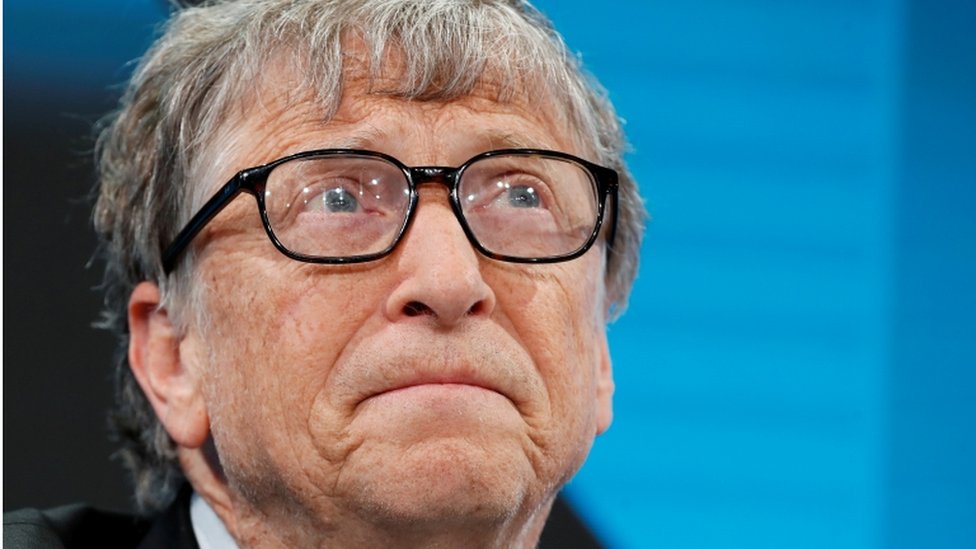
AI will replace doctors, teachers, others in 10 years – Bill Gates
Bill Gates, a co-founder of Microsoft, has claimed that improvements in artificial intelligence (AI) over the next decade may render humans superfluous for the majority of work.
In a recent interview with comedian Jimmy Fallon on NBC’s The Tonight Show in February, the billionaire philanthropist discussed how AI may take over many facets of life and business.
Gates remarked that expertise is currently “rare”, emphasising the continuous reliance on human specialists in industries such as medicine and education.
For example, we continue to rely on highly trained individuals, such as “a great doctor” or “a great teacher”, whose knowledge cannot be simply replaced by AI.
However, “with AI, over the next decade, that will become free, commonplace — great medical advice, great tutoring,” Gates said.
READ ALSO:
- Senate seeks FG’s immediate intervention to slash data prices
- Reno Omokri: Nigeria gives more opportunities than US, Britain, Canada
- Driver remanded for causing Osun varsity students’ death
In other words, Gates believes that the world is entering a new era of “free intelligence”, as he described in a recent interview with Harvard University professor and happiness specialist Arthur Brooks.
According to Gates, this transition will result in rapid breakthroughs in AI-powered technology, making them more accessible and affecting almost every part of our lives.
These breakthroughs will vary from more effective treatments and diagnoses to widely available AI instructors and virtual assistants.
“It’s very profound and even a little bit scary — because it’s happening very quickly, and there is no upper bound,” Gates told Brooks.
The discussion of how humans will fit into an AI-powered future continues.
Some analysts suggest that artificial intelligence will improve human productivity rather than completely replacing labour, hence driving economic growth and creating new jobs.
However, Microsoft AI CEO Mustafa Suleyman cautions that technological improvements in the coming years will disrupt the nature of most occupations across nearly all industries, potentially exerting a “hugely destabilising” influence on the workforce.
AI will replace doctors, teachers, others in 10 years – Bill Gates
International
Poland suspends migrants’ right to apply for asylum
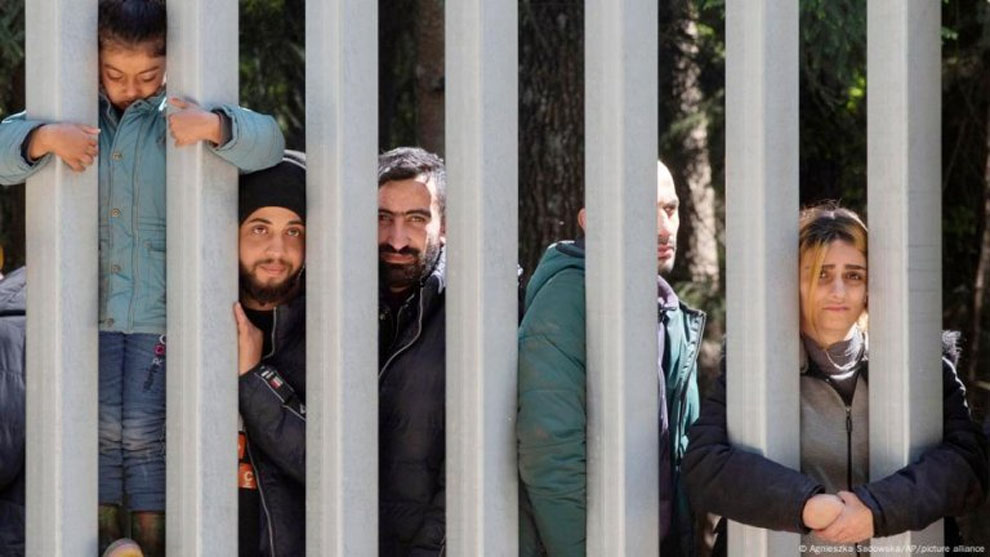
Poland suspends migrants’ right to apply for asylum
Poland has temporarily suspended the right of migrants arriving in Poland via its border with Belarus to apply for asylum.
Prime Minister Donald Tusk announced it would be happening after the controversial bill, which will allow Polish authorities to suspend this right for up to 60 days at a time, was signed into law by President Andrzej Duda.
Tusk had said it would be adopted “without a moment’s delay” while Duda said the changes were needed to strengthen security on the country’s borders.
But the law has been criticized by rights groups including Human Rights Watch, which said the EU should take legal action against Poland if it was implemented.
The group urged the country’s parliament last month to reject the bill, saying it “flies in the face of Poland’s international and EU obligations” and could “effectively completely seal off the Poland-Belarus border, where Polish authorities already engage in unlawful and abusive pushbacks”.
READ ALSO:
- Trump slaps 25% tariffs on car imports to US
- Reps pass bill to strip Vice President, governors, deputies of immunity
- Businessman collapses in court during trial over $578,000 cash seizure
The government said previously the suspension would only be applied temporarily to people who pose a threat to state security, for example large groups of aggressive migrants trying to storm the border.
Exemptions will be made for unaccompanied minors, pregnant women, the elderly or unwell, anyone exposed to “real risk of serious harm” by being returned and citizens of countries accused of conducting the instrumentalization of migration – like Belarus
Tusk has dismissed criticism from human rights groups.
“Nobody is talking about violating human rights, the right to asylum, we are talking about not granting applications to people who illegally cross the border in groups organised by Lukashenko,” he said in October.
Since 2021, Poland, Lithuania, Latvia and Finland have seen a huge increase in the number of people crossing into their countries illegally from Belarus and Russia.
Polish authorities have sent thousands of troops and border guards to police its border with Belarus and built a 5.5-metre-high steel fence along 186 km of the frontier where at times several thousand migrants have been left stranded.
Rights groups estimate more than one hundred people have died on the borders between Belarus and Poland, Lithuania and Latvia since 2021.
EU eastern flank countries and the European Commission have accused the Belarusian and Russian authorities of weaponising migration to create a new route into the EU to destabilize the bloc.
Poland suspends migrants’ right to apply for asylum
BBC
-

 metro2 days ago
metro2 days agoRivers administrator Ibas fires Fubara’s political appointees
-

 metro2 days ago
metro2 days agoJUST-IN: Ex-Oyo gov Ajimobi’s first child Bisola dies At 42
-

 metro3 days ago
metro3 days agoHow ritualists, native doctor drugged, murdered underage sisters in PH – Police
-

 metro2 days ago
metro2 days agoFG declares public holidays for Eid-el-Fitr
-

 metro1 day ago
metro1 day agoEFCC re-arraigns son of ex-PDP chairman for alleged N2.2bn oil subsidy fraud
-

 Africa2 days ago
Africa2 days agoNiger coup leader sworn in as president for five years
-

 metro2 days ago
metro2 days agoNatasha: Murray-Bruce slams Atiku, defends Akpabio
-

 International2 days ago
International2 days agoAI will replace doctors, teachers, others in 10 years – Bill Gates

